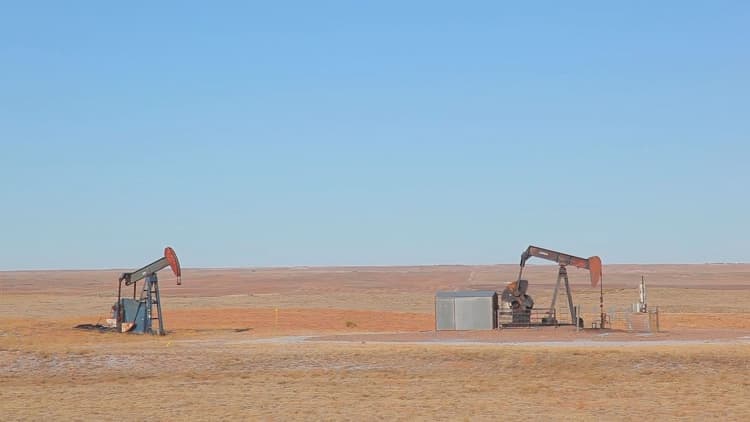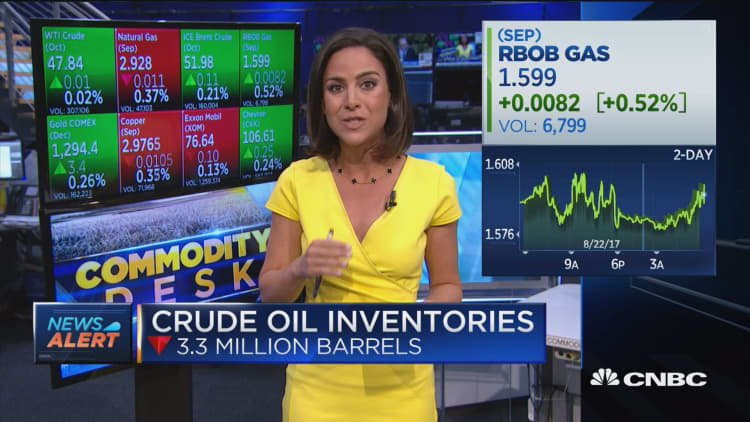Oil prices fell on Thursday amid concerns over demand as U.S. Gulf Coast refineries shut operations as Tropical Storm Harvey was forecast to turn into a major hurricane.
Benchmark Brent crude was down 59 cents, or 1.1 percent, a barrel at $51.98 by 2:15 p.m. ET (1815 GMT). U.S. light, sweet crude ended Thursday's session down 98 cents, or 2 percent, at $47.43 a barrel.
Meanwhile, U.S. gasoline prices were up 3 percent at $1.668.
The divergence of crude oil and gasoline prices appears to be a clear sign that traders are engaging in so-called crack spread buying, said John Kilduff, founding partner at energy hedge fund Again Capital.
Anticipating refinery outages on the U.S. Gulf Coast, traders were buying refined products like gasoline and selling crude oil, the primary feedstock at refineries, he told CNBC.
U.S. gasoline margins and cash prices in the Gulf Coast rose to the highest levels in almost a year ahead of the storm. Margins were on track for the biggest percentage gain since Feb.21.

The U.S. National Hurricane Center forecast Harvey was quickly strengthening and expected to be a major hurricane when it approaches the middle Texas coast on Friday and make landfall Friday night or early Saturday, and then stall near the middle Texas coast through the weekend. .
Two refineries in Corpus Christi, Texas - Flint Hills Resources' 296,470 barrels per day plant and Citgo Petroleum's 157,000 bpd plant - were shutting down operations in preparation of the storm.
Traders said they were concerned that other refineries might shutter because of flooding, affecting demand.
Exports of oil and condensates would also be affected as NuStar Energy and Magellan Midstream Partners were also shutting down their Corpus Christi terminals ahead of Harvey.
The system is located 365 miles (590 kilometers) southeast of Corpus Christi, Texas, and packing maximum sustained winds of 65 miles per hour (100 kph), the NHC said.
Offshore, Royal Dutch Shell, Anadarko Petroleum and Exxon Mobil have all taken steps to curb some oil and gas output at platforms in the Gulf.
"Operators in the area are already closing down platforms and evacuating workers as a precaution," said Sukrit Vijayakar, director of energy consultancy Trifecta.

The market was also under pressure by a stronger dollar as investors eyed a meeting of central bankers that begins on Thursday in Jackson Hole, Wyoming. The meeting, which could signal changes to monetary policy, will include speeches by U.S. Federal Reserve Chair Janet Yellen on the outlook for monetary policy and interest rates.
"Today some of the pressure in the market might be attributed to the strength in the dollar," said Gene McGillian, manager of market research at Tradition Energy in Stamford, Connecticut.
Beyond the weather, traders said declines in U.S. commercial crude storage levels were a sign of a gradually tightening market, although another rise in output held the market back.
U.S. crude oil production hit 9.53 million barrels per day (bpd) last week, its highest since July 2015 and up over 13 percent from their most recent low in mid-2016.
Despite this, U.S. crude stocks fell last week and gasoline stocks were down as well, the Energy Information Administration said on Wednesday.
— CNBC's Tom DiChristopher contributed to this report.

